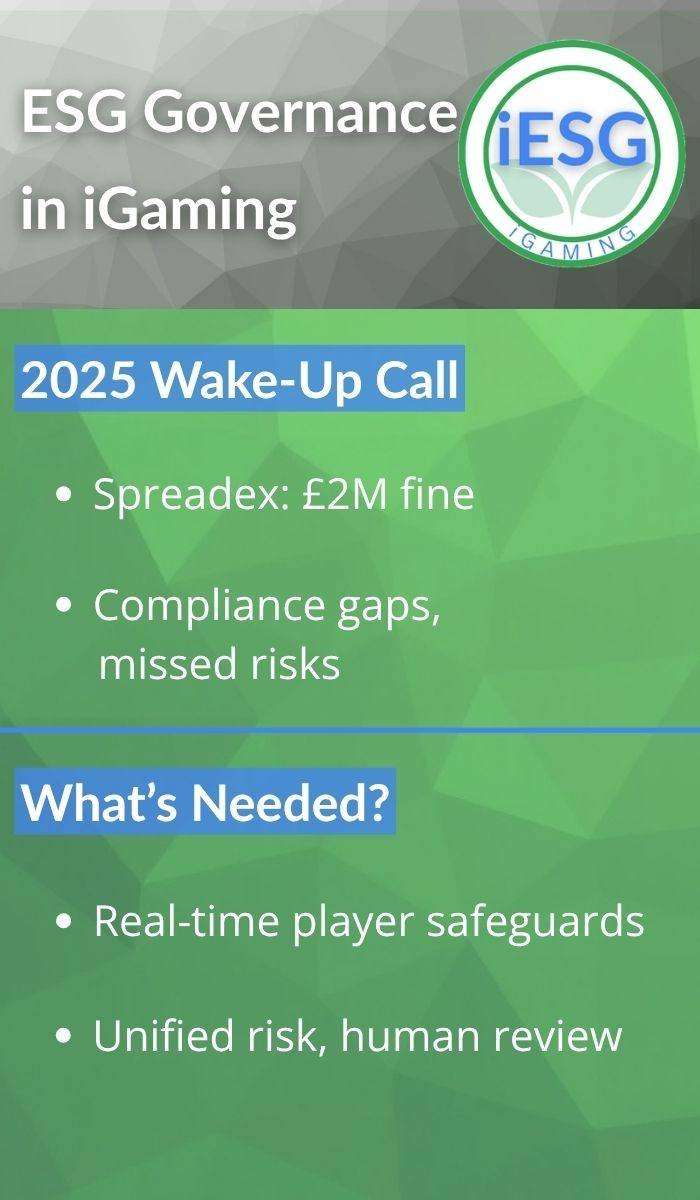Lightning struck again on May 15, 2025. What happened? The UK Gambling Commission fined Spreadex £2 million for breaching AML and social responsibility rules … its second sanction in just three years. While the headlines focus on missed checks and unchecked deposits, the deeper issue is a breakdown in ESG governance in iGaming.
The quote “Lightning never strikes the same place twice.” isn’t applicable in any governance or social related failures in iGaming. Times are changing and regulatory scrutiny is tightening.
ESG governance in iGaming matters far beyond just one company. Operators must embed governance and social risk controls into their operational DNA to remain viable, compliant, and trustworthy in 2025.
ESG Governance in iGaming: Where Spreadex Failed
Between September 2022 and November 2023, Spreadex committed a series of missteps that revealed systemic weaknesses in governance. Among the most alarming:
- A customer deposited £64,000 in a short span and lost £50,000 … without any source-of-funds request.
- Another exceeded their daily deposit cap on 12 of 14 days, with only four automated alerts and zero human review.
This wasn’t just an operational oversight. According to the UK Gambling Commission:“The operator placed undue reliance on customer assurances … rather than obtaining evidence from independent and verifiable sources.”¹
ESG governance in iGaming demands proactive systems that escalate, verify, and respond and not passive reliance on user claims. In a nutshell: Spreadex’s governance policies massively crashed. They failed to detect obvious markers of financial and behavioral risk. This isn’t just violating one of the core tenets of ESG in the form of accountable oversight.
The big issue here is that this failure goes deeper and reveals an alarmingly weak status quo in several core areas: the absence of clear escalation protocols and integrated compliance workflows. That highlights the elephant in the room. Many operators still treat governance as reactive rather than predictive. This passive stance creates vulnerabilities: regulatory, reputational and commercial.
Social Responsibility Failings: The Overlooked ESG Pillar

The “S” in ESG is often the least discussed but it should be. In this case, it’s where Spreadex’s reputation took the biggest hit.
- One user surpassed their daily deposit limit repeatedly.
- No evidence of manual review or empathetic outreach was found.
- Safer gambling tools were effectively ignored.
These are classic failings of social responsibility in the iGaming space. The Commission made clear this wasn’t a grey area:
“Effective social responsibility measures must always be in place to ensure consumers identified as being at risk receive timely and proportionate interventions.”1
Instead, Spreadex relied solely on pop-ups and failed to cross-monitor usage across betting products. This reactive, fragmented approach contradicts ESG expectations. It’s a perfect example of what might happen when iGaming social standards aren’t taken seriously. It proves that social responsibility in the form of player protection must evolve from checkbox to backbone.
Another crucial reason to fix these ESG governance in iGaming issues are stakeholder interests. Scrutiny intensifies and weak or non-existing social protocols aren’t just risk factors. They’re disqualifiers. iGaming social standards play a key role in partnerships, licensing, and investment opportunities. In 2025, social responsibility is becoming a baseline operational metric.
ESG Recovery: 2025 Standards for iGaming Governance
ESG governance in iGaming isn’t just evolving … it’s accelerating. Operators have to navigate the complexities of new regulations and shifting player expectations. Add to that the increased scrutiny from investor and voilá – ESG-forward governance in 2025 is no longer a checkbox exercise. It’s a competitive necessity. Here’s what credible and compliance-ready operators are already doing this year.
Trend #1: Unified Risk Models
Today’s leading platforms are integrating anti-money laundering (AML), player behavior analytics, and affordability data in a single, unified risk view. And the impact? Real-time monitoring of player health, financial risk, and regulatory exposure. All at once. The outcome are streamlined interventions. This risk model helps compliance teams respond faster, and more effectively.
What does this look like in practice? Imagine a scenario where a spike in player deposits, combined with erratic play, automatically flags both responsible gambling and AML concerns. Everything routes to a central dashboard, giving compliance and safer gambling officers a 360-degree player profile – in real time.
Trend #2: Mandatory Human Review
Automated systems are powerful but not flawless. Thus, 2025 is seeing a clear regulatory push towards mandatory human review for escalated cases. Whether accounts are flagged due to affordability concerns, unusual betting patterns, or KYC inconsistencies, they’re immediately escalated for expert assessment. Compliance officers must have the final say on critical interventions.
This standard not only reduces operational risk, it demonstrates a commitment to a fair process. Leading to building trust with players and regulators alike. Operators that fail to implement a documented, human-in-the-loop review process are increasingly vulnerable to fines and negative media attention. And as we saw, the latter can really damage a brand.
Trend #3: Audit-Ready ESG Frameworks
Robust ESG governance in iGaming isn’t static. Progressive iGaming operators conduct annual, independent audits monitoring their ESG and safer gambling protocols. These audits are more than financial statements. They cover everything from carbon reduction initiatives to anti-addiction measures and board diversity.
These third-party audits deliver two essential outcomes:
- Validation of real progress, not just policy on paper.
- Readiness for external scrutiny
For many, this has shifted ESG to a core part of business continuity planning.
Trend #4: Real-Time Social Safeguards
Many regulatory authorities state that generic pop-up warnings are no longer sufficient. The 2025 benchmark is real-time social safeguards that are genuinely proactive. This includes:
- Hardwired session limits
- Personalised spending caps
- AI-triggered live chat interventions by trained staff
- Temporary account cooling-off periods at the first sign of harm
Leveraging AI to monitor player wellbeing goes hand-in-hand with external auditing and mandatory human review. This is closing the loop between data, action, and accountability.
Trend #5: Report and Publicize
Transparency has become the industry’s strongest currency. ESG and Responsible Gambling (RG) metrics are now expected to be published quarterly. They shouldn’t be hidden in dense annual reports. Leading brands are moving toward real-time dashboards that track self-exclusion rates, making this information easily accessible to players.
This level of openness doesn’t just keep stakeholders informed: it normalizes transparency across the industry. Operators who shy away from public disclosure risk losing trust with both customers and investors.
💡 The iESG Assessment surfaces governance gaps and escalating risks early by uncovering recurring patterns across governance and player protection.
Lessons from Spreadex: Risk, Reputation, and Reform
Spreadex’s repeat offense is a case study in unlearned lessons. It shows what happens when governance stays static in a dynamic risk landscape:
- Internal complacency invites regulatory escalation.
- Disconnected monitoring fails players at risk.
- Surface-level policies can’t withstand public and press scrutiny.
But this case is also a pivot point. Operators that double down on ESG today will be tomorrow’s industry benchmarks. They’ll set the standards and won’t chase them.
Real ESG alignment isn’t just a reputation shield. It’s a growth lever. Those who lead with integrity will increasingly attract capital, partnerships, and player loyalty.
🏅 The iESG Certificate serves as a sector-specific reference for ESG governance in iGaming. It helps operators evidence how social responsibility and safer gambling commitments are structured and presented to regulators and investors.
Conclusion
The £2 million fine is not just a number. It’s a signal. One that regulators, investors, and the public will hear loud and clear. For iGaming brands, the question is no longer if ESG matters … it’s how quickly it’s operationalized.
Because ESG governance in iGaming isn’t about checklists. It’s about trust. About proving that systems work, leadership cares, and players come first.
The next phase of growth in this industry will belong to those who act before they’re forced to. Those who govern proactively and not just legally.
FAQ – ESG Governance in iGaming
What is ESG governance in iGaming?
Systems that ensure transparent, responsible operations, especially around AML and player protection are part of ESG governance in iGaming frameworks.
Why was Spreadex fined in 2025?
For AML failings and neglecting social responsibility protocols that exposed players to harm, a clear sign and example of non-existing ESG governance in iGaming.1
How does ESG governance in iGaming go beyond compliance?
Esg governance in iGaming includes governance, ethics, and stakeholder trust … not just meeting legal minimums.
What are examples of strong ESG governance in iGaming?
Real-time monitoring, external audits, live human escalation, and transparent player protection policies.
What’s the business case for ESG governance in iGaming?
Strong ESG reduces regulatory risk, strengthens partnerships, and enhances long-term brand value.
How can operators audit their ESG governance in iGaming?
Through third-party ESG reviews, stakeholder feedback loops, and cross-functional risk mapping.
Sources:

